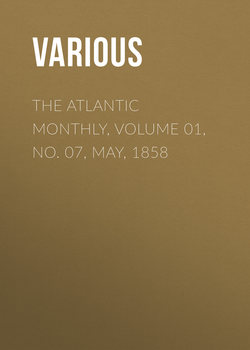The Atlantic Monthly, Volume 01, No. 07, May, 1858

Реклама. ООО «ЛитРес», ИНН: 7719571260.
Оглавление
Various. The Atlantic Monthly, Volume 01, No. 07, May, 1858
AMERICAN ANTIQUITY
ROGER PIERCE
AMOURS DE VOYAGE
IV
I.—Claude to Eustace,—from Florence
II.—Claude to Eustace,—from Bellaggio
III.—Claude to Eustace,—from Bellaggio
IV.—CLAUDE TO EUSTACE,—from Bellaggio
V.—CLAUDE TO EUSTACE,—from Belaggio
VI.—MARY TREVELLYN, from Lucerne, TO MISS ROPER, at Florence
V
I.—MARY TREVELLYN, at Lucerne, TO MISS ROPER, at Florence
II.—CLAUDE TO EUSTACE
III.—MARY TREVELLYN TO MISS ROPER, at Lucca Baths
IV.—CLAUDE TO EUSTACE
V.—CLAUDE TO EUSTACE
VI.—CLAUDE TO EUSTACE
VII.—CLAUDE TO EUSTACE
VIII.—CLAUDE TO EUSTACE
IX.—MARY TREVELLYN TO MISS ROPER
X.—CLAUDE TO EUSTACE
XI—CLAUDE TO EUSTACE
XII.—CLAUDE TO EUSTACE
XIII.—CLAUDE TO EUSTACE,—from Rome
XIV.—Mary Trevellyn to Miss Roper
INTELLECTUAL CHARACTER
LOO LOO
SCENE I
SCENE II
SCENE III
CHARLEY'S DEATH
THE CATACOMBS OF ROME [Continued.]
III
THE PURE PEARL OF DIVER'S BAY
V
VI
VII
VIII
IX
CAMILLE
THE HUNDRED DAYS
EPIGRAM ON J.M
BEETHOVEN: HIS CHILDHOOD AND YOUTH
A WORD TO THE WISE
HENRY WARD BEECHER.9
MERCEDES
THE AUTOCRAT OF THE BREAKFAST-TABLE
THE PROFESSOR'S PAPER
THE LAST BLOSSOM
THE LIVING TEMPLE
LITERARY NOTICES
EDITORIAL NOTE
Отрывок из книги
The results of the past ten or fifteen years in historical investigation are exceedingly mortifying to any one who has been proud to call himself a student of History. We had thought, perhaps, that we knew something of the origin of human events and the gradual development from the past into the world of to-day. We had read Herodotus, and Gibbon, and Gillies, and done manful duty with Rollin. There were certain comfortable, definite facts in antiquity. Romulus and Remus were our friends; the transmission of the alphabet by the Phoenicians was a resting-spot; the destruction of Babylon and the date of the Flood were fixed stations in the wilderness. In more modern periods, we had a refuge in the date of the discovery of America; and if we were forced back into the wilds and uncertainties of American History, Mr. Prescott soon restored to us the buried empires, and led us easily back through a few plain centuries.
Beyond these dates, indeed, there was a shadowy land, through whose changing mists could be seen sometimes the grand outlines of abandoned cities, or the faint forms of temples, or the graceful column or massive tomb, which marked the distant path of the advancing race: but these were scarcely more than visions for a moment, before darkness again covered the view. Our mythology and philosophy of the past were almost equally misty and vague. History was to us a succession of facts; empire succeeding empire, and one form of civilization another, with scarcely more connection than in the scenes of a theatre;—the great isolated fact of all being the existence of the Jews. All cosmic myths and noble conceptions of Deity and pure religious beliefs were only offshoots of Hebrew tradition.
.....
M. de Bourbourg fitly closes his interesting volumes—from which we have here given a résumé of only the opening chapters—with a remarkable prophecy, made in the court of Yucatan by the high-priest of Mani. According to the tradition, this pontiff, inspired by a supernatural vision, betook himself to Mayapan and thus addressed the king:—"At the end of the Third Period, [A.D. 1518-1542,] a nation, white and bearded, shall come from the side where the sun rises, bearing with it a sign, [the cross,] which shall make all the Gods to flee and fall. This nation shall rule all the earth, giving peace to those who shall receive it in peace and who will abandon vain images to adore an only God, whom these bearded men adore." (Vol. II. p. 594.) M. de Bourbourg does not vouch for the pure origin of the tradition, but suggests that the wise men of the Quiche empire already saw that it contained in itself the elements of destruction, and had already heard rumors of the wonderful white race which was soon to sweep away the last vestiges of the Central American governments.
[NOTE.—We cannot but think that our correspondent receives the traditions reported by M. de Bourbourg with too undoubting faith. Some of them seem to us to bear plain marks of an origin subsequent to the Spanish Conquest, and we suspect that others have been considerably modified in passing through the lively fancy of the Abbé. Even Ixtlilxochitl, who, as a native and of royal race, must have had access to all sources of information, and who had the advantage of writing more than three centuries ago, seems to have looked on the native traditions as extremely untrustworthy. See Prescott's History of the Conquest of Mexico, Vol. I. p. 12, note.—EDD.]
.....